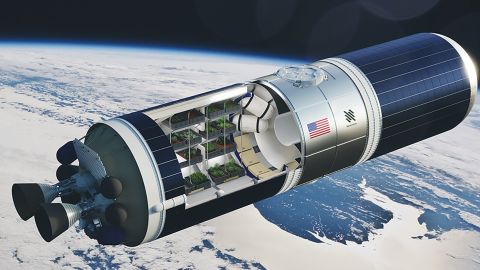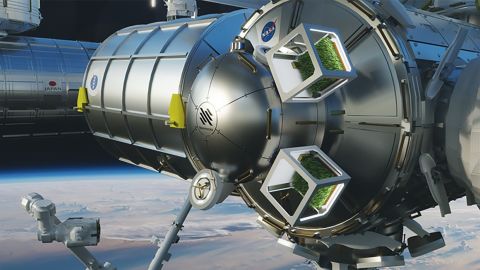By Nell Lewis, CNN Business
Tue December 20, 2022

In 2023, StarLab Oasis plans to send its first seeds into orbit.Nanoracks/Starlab Oasis
LondonCNN —
With the climate crisis making many food crops more difficult to grow, some scientists and entrepreneurs are searching for solutions beyond our planet.
Abu Dhabi-based startup StarLab Oasis, a spin-off from Texan company Nanoracks, wants to grow seeds in outer space in order to develop plant varieties that can survive on a less hospitable Earth. In 2023, StarLab Oasis expects to send its first seeds into orbit.
From soybeans to quinoa, seeds grow differently in space than on land. Without Earth’s gravitational pull, plants struggle to distinguish which way to grow, and they are also exposed to cosmic radiation. This can make seeds mutate, which can result in new, more robust or productive plant varieties — like drought-resistant crops that can grow in saline conditions.
Sending seeds to space will help “sustainability, climate change, and food security on Earth,” StarLab Oasis’ co-founder Allen Herbert tells CNN Business. “Space is a place where you have limited resources, limited energy, limited space. It’s the perfect place to do research and that same technology can be brought right back down to Earth.”
Plants have been subject to mutation breeding — exposing a species to chemicals or radiation — on Earth since the 1920s, explains StarLab Oasis’ plant scientist Connor Kiselchuk, and in the 1960s it started to be applied in outer space.

Seeds will be grown on external docking platforms at space stations, shown here in a rendering.Nanoracks/Starlab Oasis
China has sent seeds into orbit since the 1980s, resulting in new varieties of crops being used by its farmers. In 2022, the International Atomic Energy Agency and the UN’s Food and Agriculture Organization launched seeds into space for the first time, with the aim of developing crops to withstand climate change.
Herbert says StarLab Oasis will be one of the first to commercialize the process. It plans to work with companies, space agencies, universities and non-profits, to send seeds to space either for research or commercial purposes. It’s up to the clients to decide whether they will commercially breed and sell them, he adds.
One non-profit it is currently working with is the Dubai-based International Center for Biosaline Agriculture, which is looking to increase the saline and drought tolerance of crops such as quinoa, explains Kiselchuk.
Food for Mars
To begin with, StarLab Oasis will send seeds to the International Space Station (ISS) where they will be cultivated by astronauts, but its long-term aim is to send them to a commercial space station, called Starlab, which is due to be operational in 2027. When they return to Earth, they will be germinated either by the customer or in a StarLab Oasis laboratory where they will be tested to determine how they fare in specific environments, such as drought or intense heat.
StarLab Oasis, which was founded in 2021, currently has five employees and is set to expand next year. It’s backed by the Abu Dhabi Investment Office (ADIO) in the United Arab Emirates (UAE), as part of a $41 million program to increase food production in arid environments. This could benefit the UAE, which currently imports up to 90% of its food.
“(StarLab Oasis) is a hugely ambitious and exciting project that will provide access to the scientific potential of space in developing agricultural technologies for a resource-limited world,” says Abdulla Abdul Aziz AlShamsi, acting director general for ADIO.
The startup’s ambitions don’t end there.
It hopes to develop food production in space, designing off-Earth systems that can produce food on longer space missions to the moon or Mars.
Plants could provide other benefits too, says Kiselchuk, such as “oxygen generation, the filtration of some wastewater streams and psychological benefits too for the crew that are going to be away from home.”
No comments:
Post a Comment